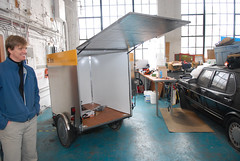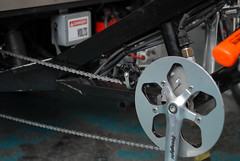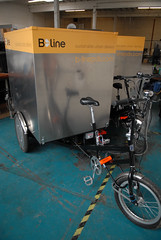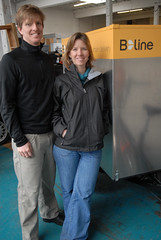
(Photos © J. Maus)
A budding Portland business is aiming to take traditional bike-based delivery services to an entirely new level. B-Line Sustainable Urban Delivery — which opened for business in early March — is a start-up company founded by the husband and wife duo of Kathryn and Franklin Racine-Jones.
“We hope B-Line can help add green core jobs and create a different type of city…we’re trying to create a new model of distributing goods in urban areas.”
— Franklin Racine-Jones, B-Line co-owner
The Racine-Jones’ (Kathryn is 36 and Franklin is 38) moved to Portland from the San Francisco Bay Area this past August, on a leap of faith that their idea would find fertile ground in a town known for bikes and an earth-friendly way of doing business. So far, it looks like they’ve made a great move.
The idea is simple: Use specially modified cargo bikes to deliver goods in Portland’s urban core. In the process, they’ll spare downtown streets from large delivery trucks (which, Franklin pointed out to me, are usually only partially loaded), and provide a more earth-friendly method to go the “last mile” in a company’s distribution chain.
Bright-eyed, but far from naive of the realities of small business, Franklin — who worked as a bike and pedestrian planner with David Evans & Associates in Eugene before moving to the Bay Area — says so far, the response has been “overwhelmingly positive”.
I met Franklin and Kathryn recently at their office, which looks right out at the busy bike lane on SE Madison at 6th Avenue.
The pair have have long been passionate about bicycles and, while on a bike tour from Japan to Ireland in 1999 (they both taught English in Japan for three years), they saw first-hand how bicycles had great potential as cargo vehicles. “On that trip,” Franklin recalled, “we saw people moving all sorts of things by bike.”
Another bit of inspiration came from a former colleague of Franklin’s whose brother started the New Amsterdam Project (which is now known as Metro Pedal Power), a bike delivery company in Boston.
Far beyond just an eco-friendly way to deliver goods, the Racine-Jones’ see their company as a way to fundamentally change the city. “We’re not doing this because it’s novel,” said Kathryn, and Franklin continued the thought, “We hope B-Line can help add green core jobs and create a different type of city…we’re trying to create a new model of distributing goods in urban areas.”
Like many entrepreneurs at the start-up phase, Franklin and Kathryn have many big ideas like connecting local farmers to restaurants (they rode their bikes to the opening of the Portland Farmer’s Market) and expanding into new goods like office supplies and wine.
At just a few weeks old, they seem to be doing quite well.
In the past two weeks alone, Franklin estimates they’ve delivered 5,000 pounds of produce for their first customer (a Eugene-based distributor). The produce is dropped in bulk at the B-Line headquarters and then Franklin and Kathryn deliver the goods into Portland’s urban core to restaurants like Bijou Cafe and Higgins. Besides the obvious savings in carbon emissions, Franklin says he has saved the city 27 trips taken by large delivery trucks (which means less wear-and-tear on streets, less congestion, and less safety risks to other road users).
B-Line has also picked up the delivery account for Portland Roasting Company and just today began delivering large packages of roasted coffee beans to 21 locations throughout downtown.
“Creating more sustainable communities is at the heart of what we’re doing, the bikes are just a tool to accomplish that.”
— Kathryn Racine-Jones, B-Line co-owner
The two bikes currently in the B-Line fleet (they plan to add more as necessary, and hopefully have future bikes made locally) are made by Cycles Maximus and are imported from London, where they are put to use as pedicabs and as official vehicles of the Royal Mail service. The Racine-Jones’ had their fleet outfitted with a custom-made cargo box. The pedal-assisted bike is outfitted with an electric motor (made by Lynch, also a British company) and can carry up to 600 pounds. Even without a full load, the going is slow. The bike moves through Portland’s streets and bikeways at a leisurely 8-10 miles per hour. But Franklin is quick to point out that, “It’s not about speed.”
“Creating more sustainable communities is at the heart of what we’re doing,” says Kathryn, “the bikes are just a tool to accomplish that.” On that same note, Franklin described a recent delivery; “When I’m riding in the Pearl District, the bikes feel like they just belong in that environment. There’s no double parking, no idling outside of cafes, it’s a very human-centered endeavor.”
B-Line joins a growing cadre of bike-powered businesses in Portland. There is talk of joining forces and organizing under one umbrella. In a city of many like-minding business owners, a new paradigm might be closer than we think.





